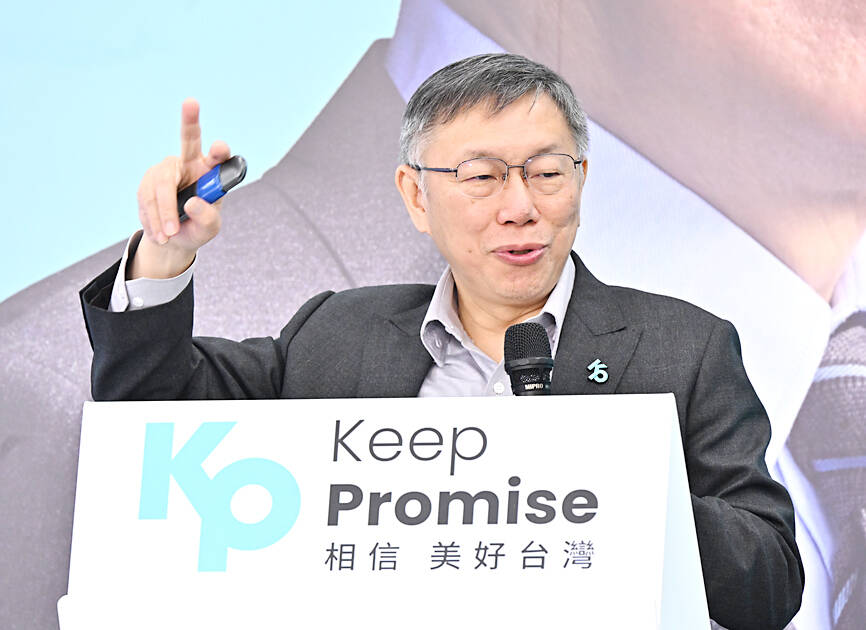Taiwan People’s Party (TPP) Chairman and presidential candidate Ko Wen-je (柯文哲) yesterday reiterated that he is “deep-green at heart” in response to accusations that he is pivoting his campaign to align closer with the ideology of the Democratic Progressive Party (DPP) in the face of flagging polls.
Ko made the remark at an agricultural policy conference in Taipei, repeating his comments from an interview with CTS News a day earlier.
Ko told the CTS host that he would continue to pursue President Tsai Ing-wen’s (蔡英文) national defense and foreign policy in general, but with an emphasis on establishing a rapport with Beijing.

Photo: Liu Hsin-de, Taipei Times
Taiwan should not neglect national defense or assume China is its enemy, he said, adding that the nation’s best defense lies in ensuring Beijing remains friendly.
Ko said he would bring about the normalization of Taiwan’s international status if elected and the opportunity presented itself.
However, insisting on being represented by a specific name would only weaken the nation, he added.
Later yesterday, Ko said he supports the deep-green political camp, as he is a descendant of a White Terror survivor.
He has never equivocated on his political leanings, said Ko, who is a physician.
Ko said he helped his patients regardless of their political affiliation when he worked at National Taiwan University Hospital.
“We all have different pasts, but share the same present,” Ko said. “The question is: Will we share the same future?”
It was at his insistence that the TPP initially included a Chinese spouse in its list of legislator-at-large nominees, Ko said, adding that building a society of coprosperity is one of the party’s ideals.
Ko said that Tsai has “done her utmost” while laboring under “the baggage of DPP ideology,” which is an impediment he would not face if elected president.
Taiwan-US ties would not change regardless of which candidate becomes president, with the nation’s relationship with China being the only variable, Ko said.
A poll released yesterday by online news firm My-Formosa.com showed Vice President William Lai (賴清德), the DPP’s presidential candidate, leading the three-way race with 40.1 percent approval.
The Chinese Nationalist Party’s (KMT) candidate, New Taipei City Mayor Hou You-yi (侯友宜), was second with 31.6 percent, while Ko had 14.8 percent, a new low.
DPP Legislator Chuang Jui-hsiung (莊瑞雄) told a news conference that Ko is “a master at mixing colors,” having changed his affiliation from green to white, and then to green again.
“If he believes he is deep-green and identifies with the DPP, he should vote DPP,” Chuang said.
“Voters do not need to choose a counterfeit when they can just get the genuine article” by voting for Lai, DPP Legislator Lin Yi-chin (林宜瑾) said.
Additional reporting by Hsieh Chun-lin

Taiwan has received more than US$70 million in royalties as of the end of last year from developing the F-16V jet as countries worldwide purchase or upgrade to this popular model, government and military officials said on Saturday. Taiwan funded the development of the F-16V jet and ended up the sole investor as other countries withdrew from the program. Now the F-16V is increasingly popular and countries must pay Taiwan a percentage in royalties when they purchase new F-16V aircraft or upgrade older F-16 models. The next five years are expected to be the peak for these royalties, with Taiwan potentially earning

STAY IN YOUR LANE: As the US and Israel attack Iran, the ministry has warned China not to overstep by including Taiwanese citizens in its evacuation orders The Ministry of Foreign Affairs (MOFA) yesterday rebuked a statement by China’s embassy in Israel that it would evacuate Taiwanese holders of Chinese travel documents from Israel amid the latter’s escalating conflict with Iran. Tensions have risen across the Middle East in the wake of US and Israeli airstrikes on Iran beginning Saturday. China subsequently issued an evacuation notice for its citizens. In a news release, the Chinese embassy in Israel said holders of “Taiwan compatriot permits (台胞證)” issued to Taiwanese nationals by Chinese authorities for travel to China — could register for evacuation to Egypt. In Taipei, the ministry yesterday said Taiwan

Taiwan is awaiting official notification from the US regarding the status of the Agreement on Reciprocal Trade (ART) after the US Supreme Court ruled US President Donald Trump's global tariffs unconstitutional. Speaking to reporters before a legislative hearing today, Premier Cho Jung-tai (卓榮泰) said that Taiwan's negotiation team remains focused on ensuring that the bilateral trade deal remains intact despite the legal challenge to Trump's tariff policy. "The US has pledged to notify its trade partners once the subsequent administrative and legal processes are finalized, and that certainly includes Taiwan," Cho said when asked about opposition parties’ doubts that the ART was

If China chose to invade Taiwan tomorrow, it would only have to sever three undersea fiber-optic cable clusters to cause a data blackout, Jason Hsu (許毓仁), a senior fellow at the Hudson Institute and former Chinese Nationalist Party (KMT) legislator, told a US security panel yesterday. In a Taiwan contingency, cable disruption would be one of the earliest preinvasion actions and the signal that escalation had begun, he said, adding that Taiwan’s current cable repair capabilities are insufficient. The US-China Economic and Security Review Commission (USCC) yesterday held a hearing on US-China Competition Under the Sea, with Hsu speaking on